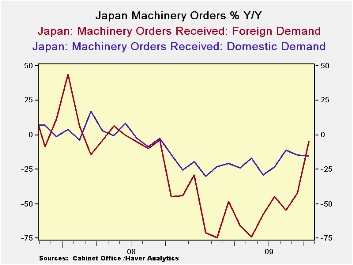 Global| Dec 10 2009
Global| Dec 10 2009Foreign orders drive recovery
Summary
Machinery orders are a volatile measure almost by design. Because of the lumpy nature and large scope of some projects it is hard to get a reliable reading on this series. Looking at core orders is one way to stabilize the signal. [...]

Machinery orders are a volatile measure almost by design.
Because of the lumpy nature and large scope of some projects it is hard
to get a reliable reading on this series. Looking at core orders is one
way to stabilize the signal. This measure excludes the most volatile
components of the order series. In October core orders fell, but that
was after rising by a sharp 10.5% in December. The sequential growth
rate of orders is on a strong upswing despite this month’s set back.
The overall orders measure that includes those large and lumpy
projects also is improving strongly. For once the trends of the two
series are in agreement even if the monthly numbers are going in
different directions.
The chart also shows domestic Vs foreign machinery orders.
While both series are showing some rise it is the foreign orders that
are doing most of the improvement. Japan like Germany is benefitting
more from demand outside of its country than from the domestic demand
within.
| Japan Machinery Orders | |||||||
|---|---|---|---|---|---|---|---|
| m/m % | Saar % | ||||||
| SA | Oct-09 | Sep-09 | Aug-09 | 3-Mos | 6-Mos | 12-Mos | 12-Mo Ago |
| Total | 3.2% | 6.0% | -1.9% | 32.7% | 43.3% | -12.3% | -27.4% |
| Core Orders* | -4.5% | 10.5% | 0.5% | 26.2% | 4.6% | -21.1% | -15.7% |
| Total Orders | |||||||
| Foreign Demand | 15.3% | 25.9% | -15.7% | 124.5% | 245.9% | -4.7% | -44.4% |
| Domestic demand | -3.0% | -5.4% | 7.1% | -7.1% | -4.6% | -15.3% | -14.1% |
| * Excl ships and electric power | |||||||
Robert Brusca
AuthorMore in Author Profile »Robert A. Brusca is Chief Economist of Fact and Opinion Economics, a consulting firm he founded in Manhattan. He has been an economist on Wall Street for over 25 years. He has visited central banking and large institutional clients in over 30 countries in his career as an economist. Mr. Brusca was a Divisional Research Chief at the Federal Reserve Bank of NY (Chief of the International Financial markets Division), a Fed Watcher at Irving Trust and Chief Economist at Nikko Securities International. He is widely quoted and appears in various media. Mr. Brusca holds an MA and Ph.D. in economics from Michigan State University and a BA in Economics from the University of Michigan. His research pursues his strong interests in non aligned policy economics as well as international economics. FAO Economics’ research targets investors to assist them in making better investment decisions in stocks, bonds and in a variety of international assets. The company does not manage money and has no conflicts in giving economic advice.
More Economy in Brief
 Global| Feb 05 2026
Global| Feb 05 2026Charts of the Week: Balanced Policy, Resilient Data and AI Narratives
by:Andrew Cates






